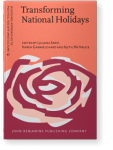Chapter 6. Contested pasts, contested red-letter days
Antifascist commemorations and ethnic identities in post-communist Croatia
Commemorations (and counter-commemorations) of the World War Two antifascist resistance movement in Croatia continue to be a source of debates over both political and ethnic identities. This chapter examines the transformation of several red-letter days in Croatia during the post-communist transition, in particular focusing on the content of the speeches given at commemorations. The new official Antifascist Struggle Day (22 June) replaced the former Uprising Day (27 July) after 1990, essentially erasing the latter from Croatia’s commemorative culture because it was considered to be too “Serbian.” The debate over these World War II commemorations, and their significance in contemporary political and ethnic identity construction will be examined by analyzing the discourse of political speeches delivered at the commemorations, the polemics present in a broad spectrum of the Croatian press, and field research (including interviews) conducted at the actual sites of memory.
Cited by (3)
Cited by three other publications
Czerwiński, Maciej
2021.
Imagining Evil and Guilt. In
Jewish Literatures and Cultures in Southeastern Europe,
► pp. 279 ff.

Hofman, Ana
2021.
“We are the Partisans of Our Time”: Antifascism and Post-Yugoslav Singing Memory Activism.
Popular Music and Society 44:2
► pp. 157 ff.

Berrocal, Martina & Aleksandra Salamurović
This list is based on CrossRef data as of 13 july 2024. Please note that it may not be complete. Sources presented here have been supplied by the respective publishers.
Any errors therein should be reported to them.
